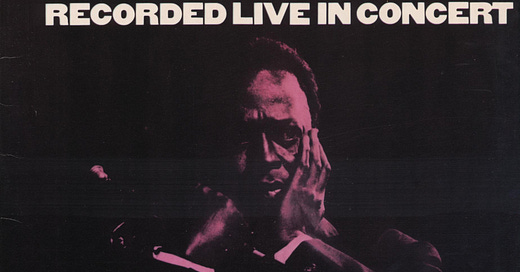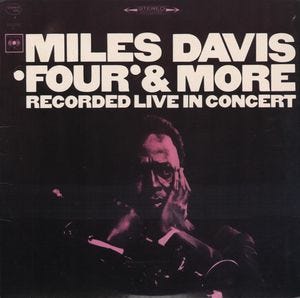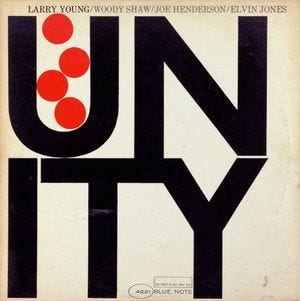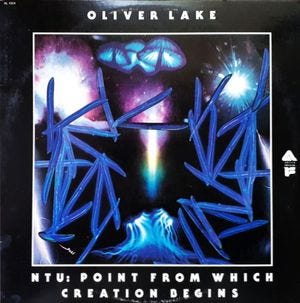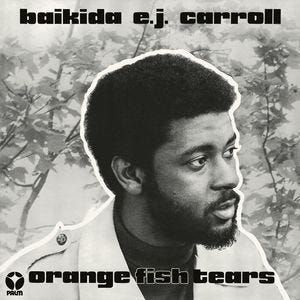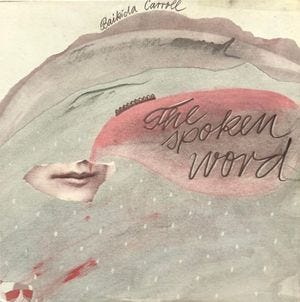Some Jazz Records: Baikida Carroll Clippings
Comments on recordings from musicians and other actors of the jazz scene. Random and not-so-random listening cues from the archives.
Miles Davis, "Four" & More: Recorded Live in Concert, Columbia CL 2453 (CS 9253), 1966, LP.
Trumpeter and composer Baikida Carroll attended the Naval School of Music, in Norfolk, Virginia in the mid-1960s. "In there I met some of the most incredible musicians I had ever seen, because in there were these nineteen, twenty years olds who did not want to go to Vietnam—so they were playing their ass off to do well to stay here," Carroll said in a 1983 Coda interview. "The school was so hard that the only time you got to jam was two in the morning, so there would be some incredible sessions—that was a heavy bebop period, and that was when I got into Miles. A friend of mine, a drummer, Leonard Smith, came to me with this Miles Davis record, he was so excited: 'Four' & More. We would play it day and night, I would go to sleep listening to that, those tempos." Released in early 1966, this Davis quintet LP contained selections recorded two years prior at New York’s Lincoln Center during a benefit for the combined NAACP, CORE, and SNCC. Columbia released the ballad numbers under the title My Funny Valentine and packed this album with notably fast renditions. The complete performances were later released as part of the Seven Steps: The Complete Columbia Recordings of Miles Davis, 1963-1964.
Larry Young, Unity, Blue Note BLP 4221 (BST 84221), 1966, LP.
"A little later there was an album by Woody Shaw that I liked; I liked those songs, with Larry Young," Baikida Carroll told Coda. "I liked playing those songs. That was the period after the army, when I came back to St. Louis." Carroll returned to his native St. Louis in 1968. The album the trumpeter was referring to is in all likelihood Unity, not a date led by Shaw, but a late 1965 Larry Young session for Blue Note on which 20-year-old Shaw played a major role, contributing half of the compositions.
Oliver Lake, NTU: Point from Which Creation Begins, Arista/Freedom AL 1024, 1976, LP.
In his "Point from Which Creation Begins": The Black Artists' Group of St. Louis, using interviews with Baikida Carroll, historian Benjamin Looker details the role played by Oliver Lake’s NTU album several years before it appeared in record stores. Released in 1976 by Arista/Freedom, NTU was taped in St. Louis in 1971 and was instrumental in getting Black Artists' Group members to Europe shortly thereafter. According to Carroll, plans had been made to use the release of the tapes by a St. Louis label as the basis for a European tour, a move inspired by accounts of favorable overseas reception brought back by members of Chicago’s AACM. Those plans ended up falling through, but the impetus provided did get BAG members — including Carroll — to Europe in 1972, closing the St. Louis chapter of the organization and opening a new one. The album was reissued by Universal Sound in 2012. More BAG music from 1972 is scheduled to be released by Wewantsounds in 2024.
Baikida E. J. Carroll, Orange Fish Tears, PALM 13, 1974, LP.
Baikida Carroll’s leader debut was made in France in 1974. "I tried to retrieve the master of Orange Fish Tears from the producer and owner of PALM Records, Jef Gilson. It was a bit difficult communicating with him because he had just suffered a stroke, and had dementia. He recently passed away on February 5, 2012," Carroll wrote in exchanges included in Garrison Fewell’s 2014 Outside Music, Inside Voices: Dialogues on Improvisation and the Spirit of Creative Music. "He occupies an extremely important role in my career, because he was the first person to ask to record my music. I will always love and appreciate him for that, as well as his insight, vision, ingenuity, and musicality. He was also just a great guy!" Carroll’s debut has finally been reissued thanks to the efforts of Parisian label Souffle continu.
Baikida Carroll, The Spoken Word, Hat Hut M/N, 1979, 2 LPs.
Baikida Carroll’s second album appeared five years, several relocations, and severe embouchure issues after his first. It was taped during a landmark series of solo concerts by various musicians at the Mapenzi club in Berkeley, California. "I had done a gig and the critics were really down on me because I was playing bebop-type stuff," Carroll told Coda. "It was at the Keystone Korner, and they were saying it wasn’t true improvising because I was playing these figures, and it was rooted in the tradition, it wasn’t pure improvising… So not necessarily to spite the press, but just to see… To see if I could sustain interest through pure improvisation. Sitting there with the audience, just you and the trumpet, and no 'Donna Lee,' no blues changes or Lee Morgan licks, just straight-ahead improvised music. That’s where the whole album came from. A concentration on spacing, and the timbre of the instrument, without diatonic chords and scales—just relating on the pure basis of sound, to paint these colors with sound, and to communicate—that’s why I titled it The Spoken Word."

